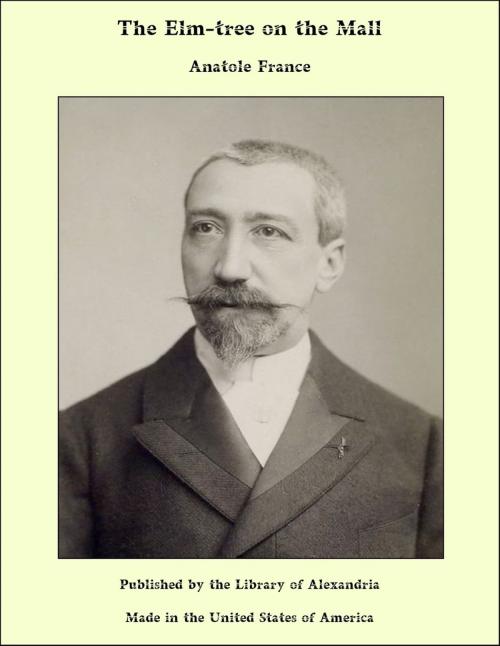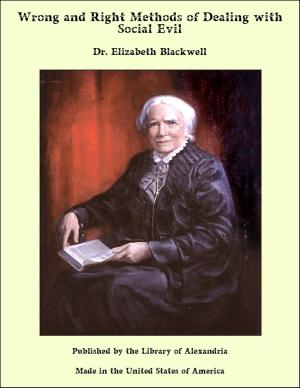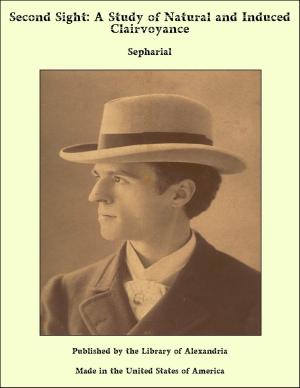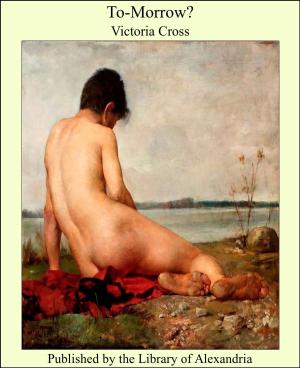The Elm-tree on the Mall
Nonfiction, Religion & Spirituality, New Age, History, Fiction & Literature| Author: | Anatole France | ISBN: | 9781465604811 |
| Publisher: | Library of Alexandria | Publication: | March 8, 2015 |
| Imprint: | Language: | English |
| Author: | Anatole France |
| ISBN: | 9781465604811 |
| Publisher: | Library of Alexandria |
| Publication: | March 8, 2015 |
| Imprint: | |
| Language: | English |
For two years Firmin Piédagnel had caused incessant anxiety to the head of the seminary. The only son of a cobbler who kept his stall between two buttresses of Saint-Exupère, he was, through the brightness of his intelligence, the most brilliant pupil in the house. Of placid temperament, he had a very fair report for conduct. The timidity of his character and the weakness of his constitution seemed a good safeguard for his moral purity. But he had neither the instinct for theology nor the vocation for the priesthood. His very faith was unstable. With his great spiritual knowledge, M. Lantaigne had no inordinate fear of those violent crises among his young Levites, which, often salutary, are to be allayed by grace. He dreaded, on the contrary, the indifference of a placidly intractable mind. He almost despaired of a soul to whom doubt was light and bearable and whose thoughts flowed to irreligion by a natural inclination. Such a one the shoemaker’s clever son showed himself to be. M. Lantaigne had one day unexpectedly chanced, by one of those brusque wiles which were natural to him, to plumb the depths of this nature, double-faced through its courtesy. He perceived with consternation that from the teaching at the seminary Firmin had only acquired an elegant Latin style, skill in sophistry, and a kind of sentimental mysticism. From that time Firmin had appeared to him as a being weak and formidable, pitiable and noxious. Yet he loved this lad, loved him tenderly, to infatuation. In spite of his disappointment it pleased him that he should be the honour, the glory of the seminary. He loved in Firmin the charm of his mind, the subtle harmony of his style, and even the tenderness of those pale, short-sighted eyes, like bruises under the quivering eyelids. He sometimes took pleasure in seeing in him one of the victims of this Abbé Guitrel, whose intellectual and moral poverty must (so he firmly believed) injure and depress an intelligent and quick-sighted pupil. He flattered himself that, if better trained in the future, Firmin, although too weak ever to give to the Church one of those powerful leaders whom she so much needs, would at least produce for religion, perhaps, a Péreyve or a Gerbet, one of those priests who carry into the priesthood the heart of a young mother. But, incapable of long self-flattery, M. Lantaigne speedily rejected this unlikely hope and saw in this lad a Guéroult, a Renan. And the sweat of anguish chilled his forehead. His fear was lest, in rearing such pupils, he might be training formidable enemies of the truth. He knew that it was in the temple itself that the hammers were forged which overthrew it. He very often said: “Such is the power of theological discipline that it alone is capable of rearing great reprobates; an unbeliever who has not passed through our hands is powerless and without weapons for evil. It is within our walls that they imbibe all knowledge, even that of blasphemy.” From the mass of the students he only demanded industry and integrity, feeling certain that these would make good parish priests of them. But in his finest students he feared curiosity, pride, the impious boldness of the intellect, and even the qualities that brought the angels to perdition.
For two years Firmin Piédagnel had caused incessant anxiety to the head of the seminary. The only son of a cobbler who kept his stall between two buttresses of Saint-Exupère, he was, through the brightness of his intelligence, the most brilliant pupil in the house. Of placid temperament, he had a very fair report for conduct. The timidity of his character and the weakness of his constitution seemed a good safeguard for his moral purity. But he had neither the instinct for theology nor the vocation for the priesthood. His very faith was unstable. With his great spiritual knowledge, M. Lantaigne had no inordinate fear of those violent crises among his young Levites, which, often salutary, are to be allayed by grace. He dreaded, on the contrary, the indifference of a placidly intractable mind. He almost despaired of a soul to whom doubt was light and bearable and whose thoughts flowed to irreligion by a natural inclination. Such a one the shoemaker’s clever son showed himself to be. M. Lantaigne had one day unexpectedly chanced, by one of those brusque wiles which were natural to him, to plumb the depths of this nature, double-faced through its courtesy. He perceived with consternation that from the teaching at the seminary Firmin had only acquired an elegant Latin style, skill in sophistry, and a kind of sentimental mysticism. From that time Firmin had appeared to him as a being weak and formidable, pitiable and noxious. Yet he loved this lad, loved him tenderly, to infatuation. In spite of his disappointment it pleased him that he should be the honour, the glory of the seminary. He loved in Firmin the charm of his mind, the subtle harmony of his style, and even the tenderness of those pale, short-sighted eyes, like bruises under the quivering eyelids. He sometimes took pleasure in seeing in him one of the victims of this Abbé Guitrel, whose intellectual and moral poverty must (so he firmly believed) injure and depress an intelligent and quick-sighted pupil. He flattered himself that, if better trained in the future, Firmin, although too weak ever to give to the Church one of those powerful leaders whom she so much needs, would at least produce for religion, perhaps, a Péreyve or a Gerbet, one of those priests who carry into the priesthood the heart of a young mother. But, incapable of long self-flattery, M. Lantaigne speedily rejected this unlikely hope and saw in this lad a Guéroult, a Renan. And the sweat of anguish chilled his forehead. His fear was lest, in rearing such pupils, he might be training formidable enemies of the truth. He knew that it was in the temple itself that the hammers were forged which overthrew it. He very often said: “Such is the power of theological discipline that it alone is capable of rearing great reprobates; an unbeliever who has not passed through our hands is powerless and without weapons for evil. It is within our walls that they imbibe all knowledge, even that of blasphemy.” From the mass of the students he only demanded industry and integrity, feeling certain that these would make good parish priests of them. But in his finest students he feared curiosity, pride, the impious boldness of the intellect, and even the qualities that brought the angels to perdition.















